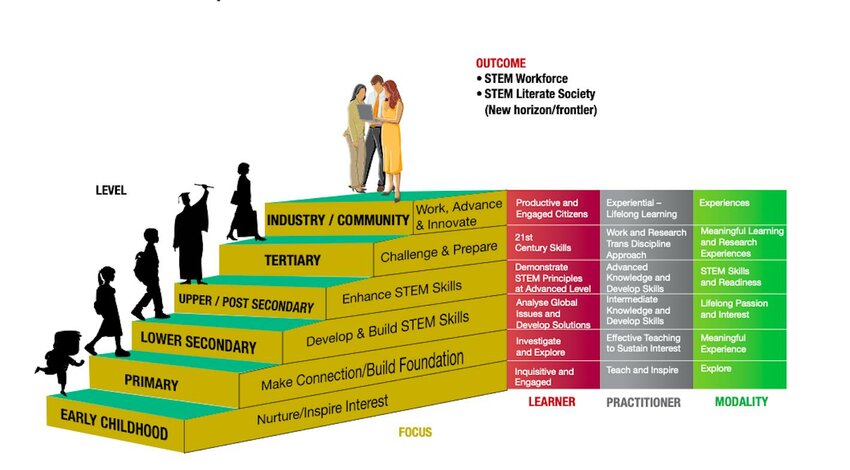Continuous Improvement for STEM Graduates: A Comprehensive White Paper
Abstract:
The rapid pace of technological advancement necessitates continuous learning and skill development for STEM (Science, Technology, Engineering, and Mathematics) graduates to remain competitive and relevant in the job market. This white paper explores the importance of continuous improvement for STEM professionals, examines various learning resources and strategies, and provides a framework for lifelong learning and professional growth.
1. Introduction
The STEM field is characterized by constant innovation and evolution. New technologies, methodologies, and research findings emerge regularly, requiring STEM graduates to continuously update their knowledge and skills. Continuous improvement, also known as lifelong learning, is the ongoing pursuit of knowledge and skills to enhance personal and professional development. For STEM graduates, this involves staying abreast of industry trends, acquiring new technical skills, and developing soft skills to thrive in dynamic work environments.
2. The Importance of Continuous Improvement for STEM Graduates
- Maintaining Relevance: The half-life of skills is decreasing, meaning the knowledge and skills acquired during formal education can become obsolete quickly. Continuous learning ensures STEM graduates remain relevant and employable.
- Career Advancement: Acquiring new skills and knowledge opens doors to new opportunities, promotions, and career advancements.
- Adaptability: The ability to adapt to new technologies and changing industry demands is crucial for long-term career success. Continuous improvement fosters adaptability and resilience in the face of change.
- Innovation: Continuous learning fuels innovation by exposing individuals to new ideas, perspectives, and approaches.
- Personal Growth: Continuous improvement enhances intellectual curiosity, expands knowledge horizons, and fosters a growth mindset.
3. Learning Resources and Strategies
STEM graduates can leverage a variety of resources and strategies for continuous improvement:
- Online Courses and Platforms: Platforms like Coursera, edX, Udacity, and Udemy offer a wide range of courses, specializations, and micro-credentials in various STEM fields.
- Professional Certifications: Industry-recognized certifications validate skills and expertise, demonstrating a commitment to professional development.
- Conferences and Workshops: Attending conferences and workshops provides opportunities to learn from experts, network with peers, and stay updated on industry trends.
- Professional Organizations: Joining professional organizations offers access to resources, networking opportunities, and continuing education programs.
- Open-Source Projects and Communities: Contributing to open-source projects allows for practical application of skills, collaboration with other developers, and learning from experienced professionals.
- Books and Publications: Reading books, journals, and research papers keeps STEM graduates informed about the latest advancements in their fields.
- Mentorship and Networking: Seeking guidance from mentors and building a professional network can provide valuable insights and support for career development.
- Hackathons and Competitions: Participating in hackathons and competitions provides opportunities to apply skills in a competitive environment and learn from others.
- Academic Torrents (with caution): While academic torrents can provide access to research papers and educational materials, it's crucial to ensure downloads are legal and ethical. Copyright infringement should be avoided.
- Reddit, Quora, and Y Combinator: These platforms offer valuable insights, discussions, and resources related to STEM fields, startups, and career development.
4. Creating a Continuous Improvement Plan
STEM graduates can create a personalized continuous improvement plan by following these steps:
- Assess Current Skills and Knowledge: Identify strengths and weaknesses in technical and soft skills.
- Set Learning Goals: Define specific, measurable, achievable, relevant, and time-bound (SMART) learning goals aligned with career aspirations.
- Choose Learning Resources: Select appropriate learning resources and platforms based on learning goals and preferences.
- Allocate Time for Learning: Dedicate specific time slots for learning activities and create a consistent learning schedule.
- Track Progress and Evaluate Outcomes: Monitor progress towards learning goals and evaluate the effectiveness of learning strategies.
- Seek Feedback and Support: Seek feedback from mentors, peers, and supervisors to identify areas for improvement.
5. Staying Relevant in a Rapidly Changing World
To stay relevant in the face of rapid technological advancements, STEM graduates should:
- Embrace Lifelong Learning: Adopt a growth mindset and commit to continuous learning and skill development.
- Develop Adaptability and Resilience: Cultivate the ability to adapt to new technologies and changing work environments.
- Focus on Emerging Technologies: Stay informed about emerging technologies such as artificial intelligence, machine learning, and data science.
- Develop Interdisciplinary Skills: Acquire skills in related fields to broaden expertise and enhance problem-solving abilities.
- Network and Collaborate: Build a strong professional network and collaborate with others to share knowledge and learn from diverse perspectives.
6. Conclusion
Continuous improvement is essential for STEM graduates to thrive in today's dynamic and competitive job market. By embracing lifelong learning, leveraging available resources, and creating a personalized learning plan, STEM professionals can stay relevant, advance their careers, and contribute to innovation in their respective fields.
References:
- Some Assembly Required: STEM Skills and Canada's Economic Productivity - Council of Canadian Academies
- Continuous Improvement in an NSF S-STEM Program - ASEE PEER
Note: This white paper provides a general overview of continuous improvement for STEM graduates. Specific learning resources and strategies may vary depending on individual career goals and industry requirements.



